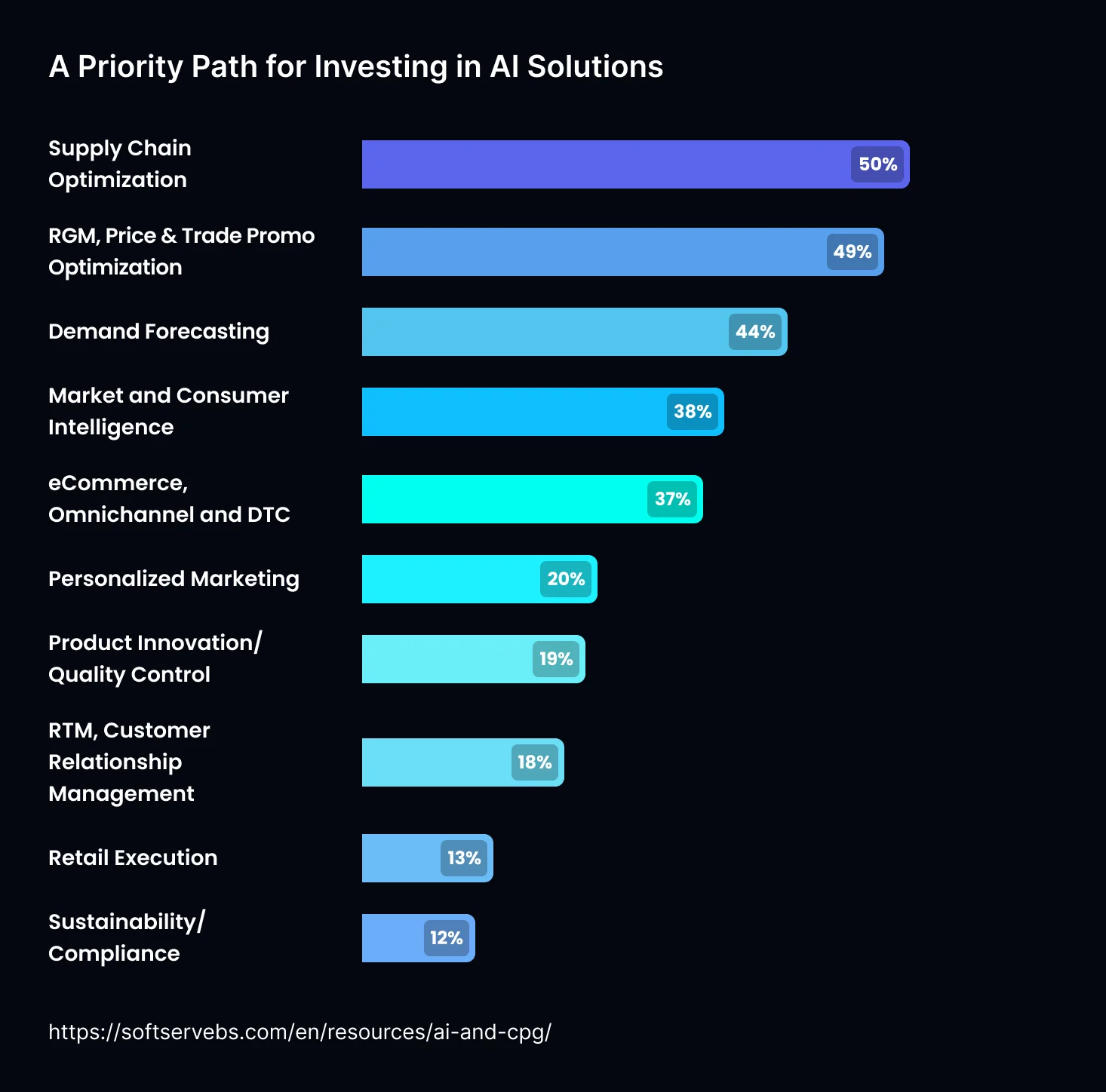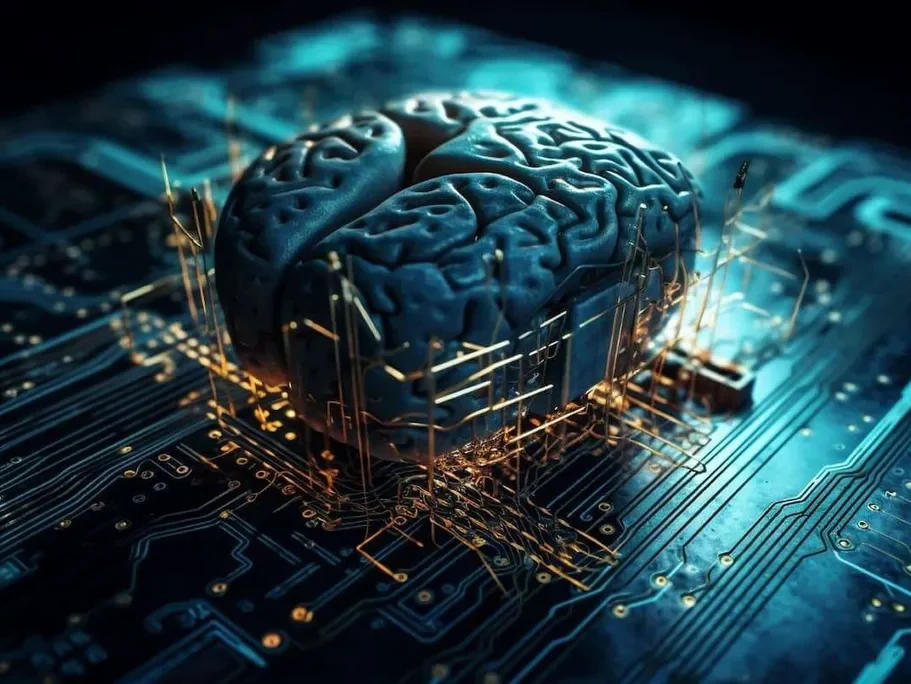According to Towards Packaging, the global consumer packaged goods (CPG) market is expected to be worth $3,171.11 billion by 2032. Like other sectors, CPG faces challenges due to legacy systems and manual processes. The solution to these challenges lies in artificial intelligence (AI). Firms that want to thrive are implementing AI for CPG, while those that play it safe are falling behind.
While the sector is thriving and growing, it lacks technology. A recent McKinsey research found that 39% of CPG firms surveyed had trouble integrating analytics due to cultural resistance.
Today, 45% of consumer packaged goods manufacturers are concerned about an information gap. This blog post will explore how data systems, including AI, may enhance the sector by effectively predicting and responding to changing client demand patterns.
AI in CPG Explained

AI for CPG is the process by which firms utilize artificial intelligence to analyze large datasets, predict customer behavior, and improve supply chain management. Artificial intelligence is becoming an increasingly powerful tool for implementing targeted advertising campaigns and increasing operational efficiency.
AI is also changing the way CPG firms interact with their customer base. Smart systems automate customer segmentation, e-commerce personalization, recommendations, email newsletters, and other related processes. They help create exciting and relevant content to deal with different customer groups. In addition, AI-driven software has allowed CPG firms to use advanced analytics to find innovative ideas, detect trends, and make rational decisions based on data.
As CPG evolves, AI instruments will play an increasingly important role in shaping the sector’s future. Brands that invest in the right AI-fueled systems will be better prepared to overcome the challenges and seize the opportunities that lie ahead.
How AI is Revolutionizing the CPG Sector
Let’s examine some of the top CPG processes where experts believe AI and advanced analytics will play a key role for brands.
- Order life cycle optimization. Custom-built AI systems are successfully taught on their datasets to solve non-standard business problems. In CPG organizations, such models generate contextual information to enhance the full order life cycle. They may analyze historical order information to find patterns and use real-time data on vehicle capacity, damaged products, and other critical moments to make rational decisions.
- Product creation. Firms that want to gain a competitive advantage must present new, unique products that appeal to customers. AI-backed systems analyze information from various sources, including customer feedback, market conditions, and social media, to identify customer preferences. Businesses can use this data to create products that meet these needs, leading to more successful releases. Smart systems suggest different ingredient combinations, packaging design AI, and promotion tactics to process the information.
- Quality control. CPG artificial intelligence can automate various stages of quality tracking by evaluating information from cameras and sensors at production sites. AI-fueled software can then detect errors or deviations from specified norms to decrease human inaccuracies and maintain high quality.
- Personal approach. Customers demand a personalized approach from the businesses they interact with, and AI helps CPG firms meet all expectations. It studies customer information and helps firms create unique experiences for individual users. Smart systems can personalize shopping recommendations using customers’ order history, preferences, and online behavior patterns.
It is difficult to overestimate the importance of impeccable client service in CPG today. AI-driven bots and online assistants allow firms to provide fast and individualized assistance. Such systems may handle a wide range of requests, from product information to troubleshooting, without the involvement of live agents.
Challenges and Opportunities of AI in the CPG Area
AI for CPG provides several benefits. However, one should not forget some difficulties arising during the implementation process.
- Quality and availability of information. AI-backed systems require significant databases to operate effectively. However, access to relevant and diverse information can be a challenge. Reliable data management systems and processes are necessary to provide accurate AI information.
- Talent shortage. Implementing AI requires the participation of specialists with experience in data and machine learning. Currently, there is a talent shortage in these areas, making it difficult to work with smart systems.
- Marketing and compliance. A key task in CPG marketing is ensuring legal and ethical standards. Today, AI is increasingly being adopted into the decision-making process; there is a need for transparency and accountability to avoid bias and discrimination.
While AI offers valuable insights, human expertise and judgment are essential for effective decision-making. Firms may combine AI, human creativity, and deep contextual understanding to leverage smart technology for digital transformation fully.
Tips on Working with AI for CPG
Firms that want to use AI should implement best practices that align with their goals. Let’s look at some recommendations for using AI in consumer goods.
- Expand skills. If your staff is getting used to interacting with smart systems, training them in technical aspects and ethics is essential. All specialists who perform analysis and make decisions should have the necessary tools and know the protocols.
- Federated governance models. Decentralized governance allows different teams to implement AI ideas while adhering to common business standards. This concept ensures flexibility, creativity, and scalability by distributing decision-making across various departments.
- Form a governance structure. To deal with AI, it is necessary to clearly describe all roles, responsibilities, and procedures. A complete structure is based on database protocols, ethical rules, and performance monitoring standards.
Such practices ensure ethical AI adoption by maximizing value and reducing risks.
Final words
AI is transforming the CPG sector, offering a range of benefits to drive productivity and growth. Firms can use AI to manage supply chains, improve customer engagement, innovate products, and increase efficiency.
At MetaDialog, we strive to continually innovate on the cutting edge of AI, as our team of experts understands all the needs of businesses. If you want to add smart systems to your operations, contact us!
